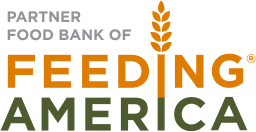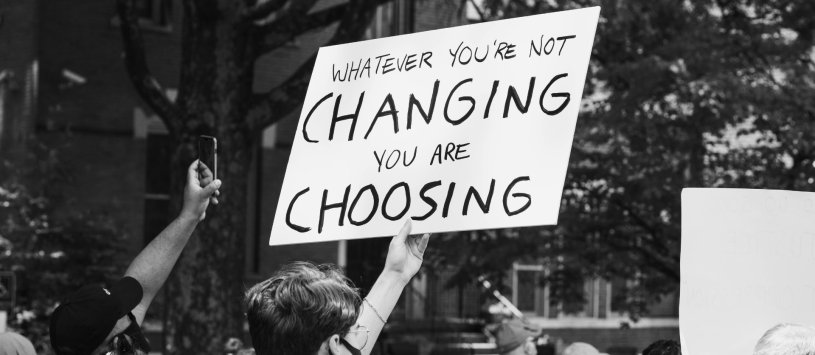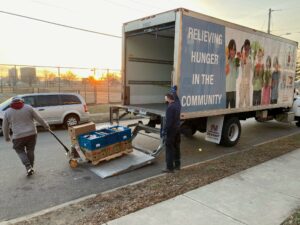April is for Advocacy
Many Initiatives Recognized in April Align with Our Work
By Amber Wright, Development and Marketing Coordinator
At The Foodbank, we recognize that hunger can’t be solved with just food. Getting nourishment to families experiencing hunger is a crucial part of our work, but not a solution to the problem. We have expanded our focus from feeding the line to shortening it. Our new mission statement of “Eliminating hunger and its root causes” reflects our attention on the social determinants of health and the different factors which put people in our lines. April is a month full of advocacy that aligns with our new mission. Here are some of the topics that our work relates to.
National Minority Health Month
The purpose of Minority Health Month is to raise awareness of the health inequities that exist in the United States, particularly in communities of color. Black Americans endure worse health outcomes than their white counterparts. This includes disparities in rates of chronic diseases, such as diabetes and heart disease. Black Americans are also less likely to have access to healthcare and other resources that can improve overall health.
Redlining and other forms of systemic racism have caused these communities to suffer more from challenges like poverty, food deserts, lack of adequate healthcare, and ultimately higher rates of food insecurity. The COVID-19 pandemic only worsened these inequalities. Food insecurity, (which is defined as the lack of access to enough nutritious food for an active, healthy lifestyle), can contribute to chronic diseases and negative health outcomes. This is because people are often forced to rely on inexpensive, low-nutrient foods to make meals. The process can be cyclical since they are then saddled with additional medical expenses, weighing even more heavily on their ability to put food on the table.
Recognizing the importance of a healthy diet, we place a high priority on providing fresh produce and lean protein to our neighbors whenever possible. Last year, The Foodbank distributed almost 4 million pounds of fresh fruits and vegetables alone. We also work to address food deserts and concentrated poverty by sending our mobile pantries to high-need areas and areas with identified gaps in services. Finally, we work to understand and educate the public about systemic racism and the social determinants of health.
Second Chance System Impacted and Returned Citizens Month
This month is set aside to raise awareness and advocate for policies that set a strong foundation for people with criminal records to successfully reintegrate. After engaging with the criminal justice system, many people struggle to find stable housing and employment with livable wages. They face challenges like discrimination, lack of access to education and job training programs, and limited financial resources. These factors lead to higher rates of food insecurity compared to the general population.
Although it is formally known as “second chance” month, we do not embrace that title. “Second chance” implies that everyone started out with equal access to fair opportunities, which we know is not the case. The stigma attached to this descriptive term (and many others) overlooks several factors, like over policing, wrongful convictions, undiagnosed mental health issues presenting as criminal behavior, the cyclical symptoms and effects of poverty, the ability of the wealthy to evade convictions, variation among state and local legislations in defining crime, sentencing disparities, and the over-representation of minorities and the poor in carceral institutions. Black Americans are incarcerated at nearly 5 times the rate of white Americans, and Latino Americans are imprisoned 1.3 times the rate of white Americans, despite both being minority groups.
Using this kind of language just reinforces the perceptions and prejudice that drive mass incarceration. Evidence shows high incarceration does not effectively increase public safety. The U.S. has the highest incarceration rate in the world, yet murder, rape, gun violence, and other crimes remain high. With the lack of education, therapy, and resources typical of jails and prisons, it would seem incarceration is more of a profit-making tool or an act of retribution, thinly disguised as a solution.
At The Foodbank we believe anyone who has served a sentence issued by the criminal justice system has paid their debt to society. Therefore, additional consequences should not come after release.
Currently, more than 40% of The Foodbank’s workforce are people who have been previously involved with the criminal justice system. We feel the best way to reduce recidivism is to address the unique needs of our employees so they can thrive both in life and in the workforce. For some, this may be their first real chance of moving out of the circumstances they were born into. We have made it a priority to offer a livable wage, starting every employee at a minimum of $18/hour with benefits. We are also intentional about providing training opportunities and workforce development to help individuals succeed, even outside of our organization. For example, we offer the Dayton Equity Center the space and equipment to hold forklift training sessions for community members outside of our workforce, many of whom are system-impacted.
We see this work as an opportunity for personal transformation as well as a means of shortening our line. If system-impacted individuals are granted jobs with livable wages, they are far less likely to depend on the charitable food network. It also lowers recidivism rates and grows the workforce, benefitting the entire community.
Fair Housing Month
Fair Housing Month celebrates the Fair Housing Act, the law prohibiting discrimination in the process of obtaining housing through different schemes. This includes discrimination in the rental, sale, and financing of houses based on color, race, or gender. As mentioned before, redlining and racism have systemically kept people of color from home ownership in many areas, which in turn can affect other aspects of a person’s physical and financial well-being.
Another initiative embraced by The Foodbank is education about systemic racism and its historical roots in our community. Training on this topic provided by the Racial Equity Institute is offered to all of our employees, as well as guest speakers on topics like redlining. Starting with our own staff, we strive to be informed about this subject and its impact on our community today. Only through understanding can we make informed decisions and effect policy change that is equitable and sustainable.
Earth Month
Earth Month is about raising environmental awareness and creating consciousness around issues that impact our planet’s well-being. The effects of pollution and overdevelopment affect everyone, and we all play a part. As a foodbank, we strive to be part of a sustainable food system and create a positive impact on our surroundings.
We have transformed an unusable parking lot into our urban garden and greenhouse. The place once filled with broken glass and toxic rubbish is now home to fruit trees, sunflowers, and raised garden beds. We even have a flower bed full of native plants to attract pollinators. This revitalized space allows us to grow our own fresh produce without harmful chemicals and provides learning opportunities to students and other visitors.
Our compost program is another notable piece of our efforts. Diverting food from the landfill reduces the amount of greenhouse gas emissions it would create. Instead, we add it to our in-vessel composter where it becomes a nutrient-rich soil additive for our urban garden. This is another system that draws interest, participation, and collaboration from both individuals and organizations throughout our community. Just recently, our team even joined a compost degradation test pilot, which aims to study and create standards for the new compostable materials circulating the market.
Celebrate Diversity Month
This month aims to build tolerance, inclusion, and unity among varying cultures and backgrounds. Diversity in the workforce is important to ensure the inclusion of different perspectives and ideas when making decisions.
Inclusion is one of our core values. We believe everyone deserves a seat at the table, especially when working to eliminate hunger in our communities. Our staff reflects a range of diversity in race, religion, sexual orientation, religious practices, and backgrounds. We will continue to celebrate this diversity and create opportunities for everyone’s voice to be heard.
National Volunteer Month
National Volunteer Month has been celebrated by our organization since its inception. It is about acknowledging the generosity of volunteers and their incredible impact. Acts of kindness and service to others are critical for the betterment of our society.
Volunteers are a vital part of our work, and their contributions help carry out our mission. These “hunger heroes” help build our CSFP senior boxes, assemble our Good-to-Go Backpack meal kits, pass out food in our weekly Drive Thru, harvest lettuce from our greenhouse, work in our urban garden, sort food drive items, pack emergency boxes and more. Some people spend time with us so regularly that they feel like a part of our family.
Last year we hosted more than 2,000 volunteers in our warehouse, to whom we are eternally thankful. Without their help, our impact would be considerably more limited. We would not be able to serve as many neighbors as we can now, thanks to their helping hands.
Food Waste Prevention Week
This initiative is very new, originating in 2015. The movement brought attention to how much food goes to waste in our county. Nearly one-third of all food produced never gets consumed. Not only is life-giving nourishment going to waste, so is the water, energy, and labor used to make it.
Reducing food waste is very important to our work, beginning with our Food Rescue program. We partner with several grocery stores to salvage food that would otherwise go unsold. This product is donated to our organization, and we distribute it through our Drive Thru or network of partner agencies. Not only does this reduce the amount of food that goes to waste, but it helps countless families facing hunger.
The Foodbank distributed roughly 15 million pounds of food in 2022. Of that, nearly 4 million pounds was fresh produce. When working with that amount of fruits and vegetables, you can expect to find a few bad apples in the bushel. We add these into our composter, along with food waste collected from the public through our Compost Bucket Program.
Conclusion
Many initiatives celebrated in April align with our efforts . We can only ensure everyone has enough food to eat if we are part of a sustainable food system. Environmental and social factors all play a role in achieving this. Poverty, unemployment, low wages, insufficient housing, and food deserts are all barriers to the food security we strive toward; and are often the result systemic racism and discrimination.
This month and every month, we celebrate all these causes and more. We can’t solve hunger with just food, but we can solve it through understanding and thoughtful collaboration.





No comment yet, add your voice below!